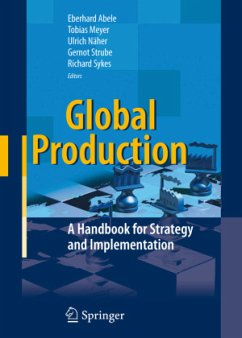Global production and purchasing operations create a platform for entry into new markets. However, it takes considerable effort to plan and implement a sustainable globalization strategy; this book will help in that task. The wealth of experience and analysis featured in this book is the result of an extensive survey among leading manufacturing companies as well as countless discussions with executives who have personally wrestled with the issues of "going global." The book treats the whole range of management challenges.
In breadth and depth, the insights it offers surpass what a manager or most individual companies could acquire on their own.
What is the best configuration for a global production network? What are the different dynamics in low-cost vs. high-cost countries? Getting the answers right is key to building a competitive and efficient global production network. Centers of economic activity are shifting profoundly, globally and even regionally. Production is shifting even more dramatically than the economy as a whole, making it critical for decision makers to know what criteria matter most and how to make the right decisions on where to invest. Regardless of the industry involved, an optimized global footprint can translate to a competitive advantage. A comprehensive redesign typically yields a 20 to 40 percent reduction in manufacturing costs. Global production and purchasing operations create a platform for entry into new markets. Planning and implementing a sustainable globalization strategy, however, takes considerable effort; this book is there to help in that task.
The wealth of experience and analysis featured in Global Production is the result of an extensive survey among leading manufacturing companies as well as countless discussions with executives who have personally wrestled with the issues of "going global." In breadth and depth, the insights it offers surpass what a manager or most individual companies could acquire on their own.
In breadth and depth, the insights it offers surpass what a manager or most individual companies could acquire on their own.
What is the best configuration for a global production network? What are the different dynamics in low-cost vs. high-cost countries? Getting the answers right is key to building a competitive and efficient global production network. Centers of economic activity are shifting profoundly, globally and even regionally. Production is shifting even more dramatically than the economy as a whole, making it critical for decision makers to know what criteria matter most and how to make the right decisions on where to invest. Regardless of the industry involved, an optimized global footprint can translate to a competitive advantage. A comprehensive redesign typically yields a 20 to 40 percent reduction in manufacturing costs. Global production and purchasing operations create a platform for entry into new markets. Planning and implementing a sustainable globalization strategy, however, takes considerable effort; this book is there to help in that task.
The wealth of experience and analysis featured in Global Production is the result of an extensive survey among leading manufacturing companies as well as countless discussions with executives who have personally wrestled with the issues of "going global." In breadth and depth, the insights it offers surpass what a manager or most individual companies could acquire on their own.
From the reviews: "This book, an update of the 2005 German edition, is based on interviews with 100+ managers at 54 companies in Western Europe, North America and Asia ... . The book, with a good quality touch, is filled with examples and data from companies and it has well-constructed, insightful data graphs and figures ... . I would highly recommend this book to academicians, consultants and practitioners or anyone who would like to know more about the inner workings of global production networks." (Gyula Vastag, International Journal of Production Research, Vol. 47 (19), October, 2009)








